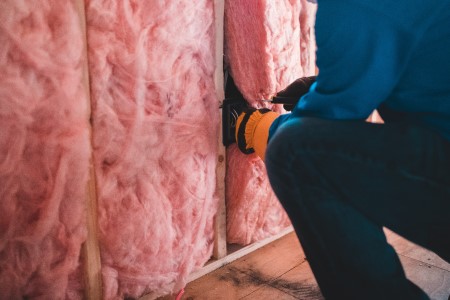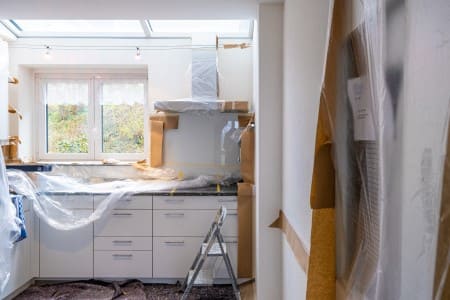
Sustainability and efficient energy have become the forefront of the property industry. Energy Performance Certificates (EPC) regulations are changing, and landlords need to be ready. From 2025, all new tenancies will need to have an EPC rating of ‘C’ or above. This will be applied to all tenancies from 2028. That doesn’t leave much time for landlords to comply – with minimum standard currently resting at ‘E’ rating. In this blog we’ll explore 8 different energy efficient upgrades that conserve energy at home.
What is an ‘Eco Home’?
There are many names for eco homes – ‘sustainable housing’, ‘environmentally friendly homes’ – but they all have one key focus. An eco-home should improve the asset’s energy efficiency and minimise the impact on the environment.
Small changes you can make
There are plenty of small changes you can make to your property. Potential buyers are become increasing more environmentally conscious. Therefore, making energy efficient upgrades as well as using eco-friendly materials and technologies to save energy at home could boost interest for property investors and increase the overall property value by as high as 14%.
Source: MoneySupermarket.com

1. Mist shower
Rain misting showers are an easy add-on that emits only very fine drops of water, minimising the amount of water used per shower. They help to:
- reduce wastewater usage
- lower energy costs
- decrease emissions from distribution
Taking a shower is not something we really think about on a day-to-day basis. In 2019, the second most significant uses of energy – following heating – for a majority of UK homes came from shower usage. A standard shower will release 12 litres every minutes. It’s estimated that everyone takes at least one shower per day – whether that’s at homes, in the gym or staying in a hotel. By reducing the flow of water with finer water droplets, a mist shower could help improve your home’s water wastage, reduce your water bills and overall conserve energy at home.
Source: Waterwise.org
2. Improve insulation
As energy bills are exponentially rising, homeowners and tenants alike prioritise an overall higher EPC rating, helping to conserve energy at home. Insulation is one of the top energy efficient upgrades to undertake. Increasing your property’s insulation will help it retain its heat & improve energy efficiency. This could result in cheaper heating bills.
There are two types of insulation improvement:
- Loft insulation
- Cavity wall insulation
Loft insulation is notably the cheaper option of the two, as well as being quick and easy to install.

3. Solar panels
Solar panels are another great energy efficient upgrade to conserve energy at home. They are often installed on the roof of a property to generate renewable solar energy. Solar panels can cost anywhere from £10,000 – £15,000 for a 4kw system. This will depend on factors such as number of panels and roof space.
There are two types of solar panels:
- Solar PV panels: For a 4kW system, you would expect to use 12-16 panels as they are only 20% effective on average.
- Solar thermal panels: You often see those as one flat panel on the roof. They are about 80% effective.
Not only will solar panels help you reach the EPC 2025 deadline, but they could also reduce your monthly energy bills – becoming an attractive bonus for renters.
Source: Homebuilding

4. Replacing your boiler
Replacing your boiler might seem like an added expense to being a landlord, but it holds the potential to conserve energy at home by as much as 34%. Building regulations stipulate that any new boiler must be A-rated for energy efficiency.
Source: Centre of Sustainable energy
There are two key types of boilers you could consider for your energy efficient upgrade:
- System boilers: These have a separate cylinder to store hot water.
- Combi boilers: They don’t require a hot water cylinder as it only heats water on demand.
Combi boilers are highly efficient, minimising the amount of water heated only to remain unused and cool throughout the day. However, there are several factors that you should consider:
- The number of people living in the property: A large number of occupants in the property may benefit from a system boiler. For example, large student accommodation may require a system boiler to ensure the property has enough hot water for morning showers due to the number of people living within the property.
- The size of the property can also be a contributing factor: As combi boilers do not require a large storage tank, they are often sought after for smaller, semi-detached properties. Focusing on storage space over a large boiler tank is also another way to attract tenants.
5. Windows
Double- and triple-glazed windows are a great way to keep heat locked into your property and conserve energy at home. They help minimise drafting and retaining the warm air inside your property.
On top of this, having more and larger windows could conserve energy used for lighting by utilising natural light. Large windows are often attractive for tenants too.
Triple glazing helps prevent heat from escaping, saving energy and therefore cutting bills, due to an extra layer of insulation.
6. Heating recovery ventilation systems (HRVS)
Another great energy efficient upgrade is a heating recovery ventilation system. HRVS extract the moist and warmer air from the house – mainly bathrooms and kitchens – and uses this to heat the fresh air coming in. It then evenly distributes this air throughout the key areas of the house, such as sitting rooms and bedrooms. Simultaneously, it ventilates the stale air, originally collected, back outside. By utilising the collected heat, it reduces the amount of wasted energy whilst evenly spreading fresh air readily at room temperature across the property.
7. Rainwater harvesting
Rainwater harvesting relates to the collection of wasted water from the roof. This is stored and then re-used across the property – both in the home and garden. It can reduce the water bill and provides a more sustainable way of living.

8. Smart gadgets to conserve energy
Implementing smart home technology can be a great way to manage and conserve energy at home. Using smartphones to control temperature and operate lights is quickly becoming a popular energy efficient upgrade. By the end of June 2021, government data shows 25.2 million smart and advanced meters are now in operation across the UK, for homes and small businesses.
Other ways to improve energy efficiency
There are a variety of other techniques which you can implement to improve your home’s energy efficiency. Even the smallest actions can hold significant changes:
- Utilising locally sourced materials, to reduce the amount of fuel used in transportation
- Avoidance of plastics and use naturally sourced materials such as timber
- High air-tightness levels to minimise draughts
- LEDs instead of halogens
- Composting toilets

How to finance energy efficiency upgrades
Following the Green Home Grant in March 2021, the government will be releasing a new scheme in 2022. The Boiler Upgrade Scheme will provide an opportunity to install low-carbon heating systems. The government will provide £5000 grants to households, to help decarbonise heat and buildings. You can find out more about the scheme on the Gov.uk website.
Bridging loans are a fast and effective way to raise finance quickly for property renovations or conversions. Other elements you can consider are:
- Draughtproofing
- Smart metres
- Composting toilets
- Rainwater collection
You can also raise funds through a second charge bridging loan. If you’re looking to make energy efficient upgrades to conserve energy at home, then check out our permitted and light development bridging loans here.
Before making changes to your property, it’s always good to check with your local planning office to ensure you are in keeping with regulations.
Disclaimer
MFS are a bridging loan and buy-to-let mortgage provider, not financial advisors. Therefore, Investors are encouraged to seek professional advice.










